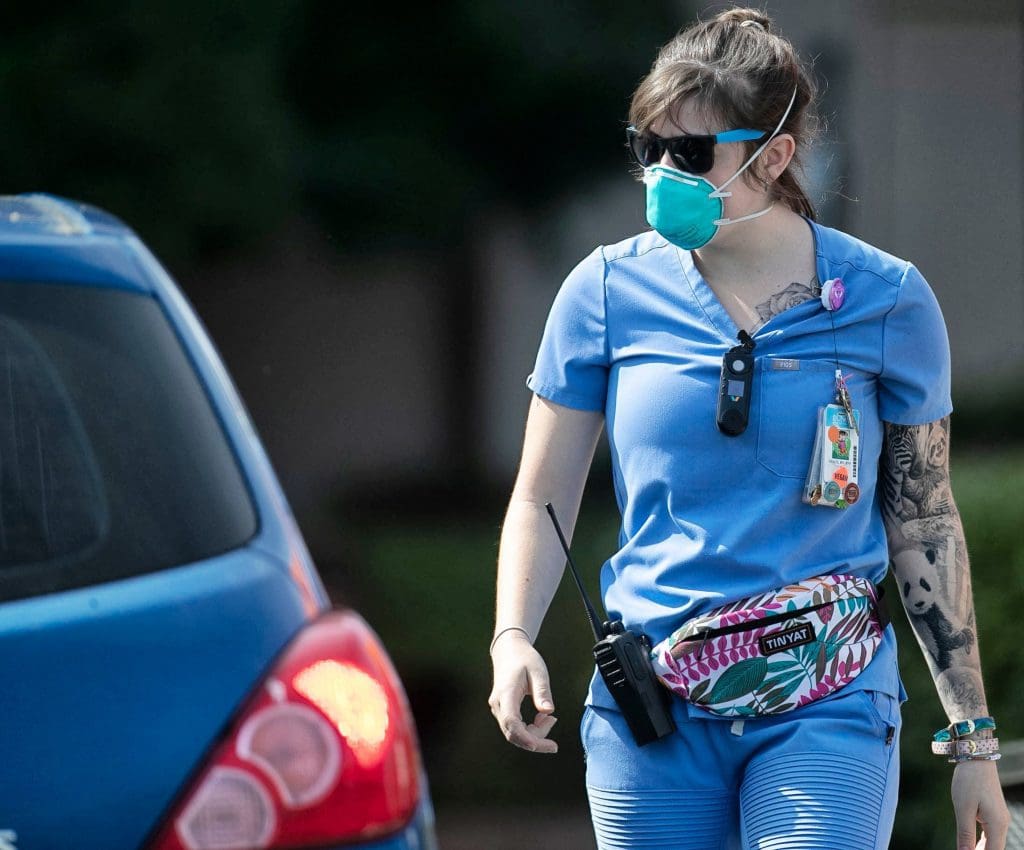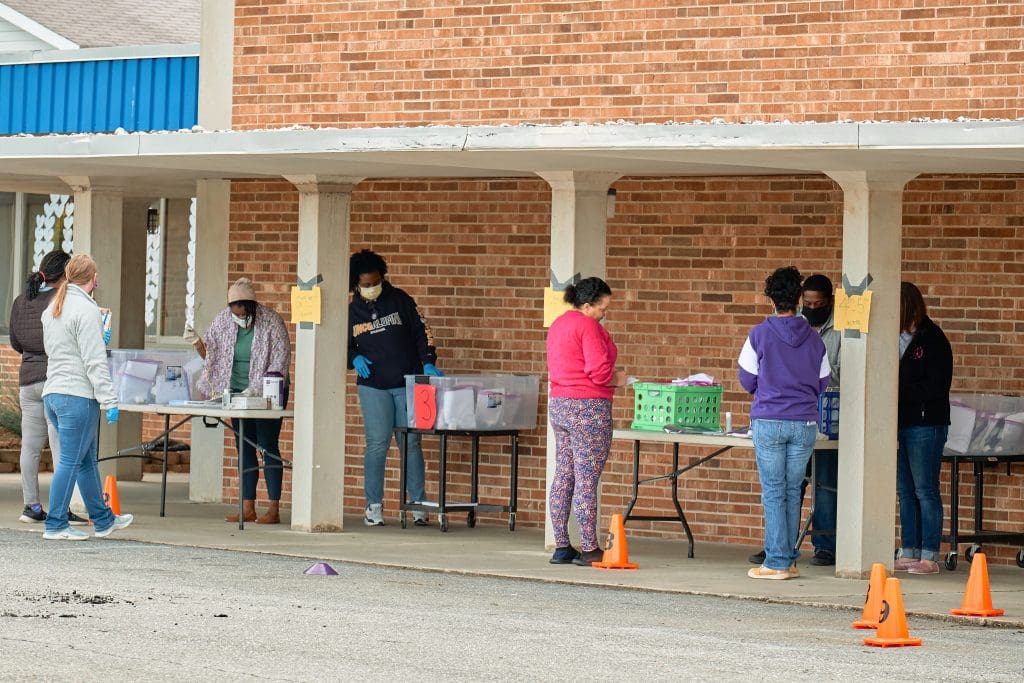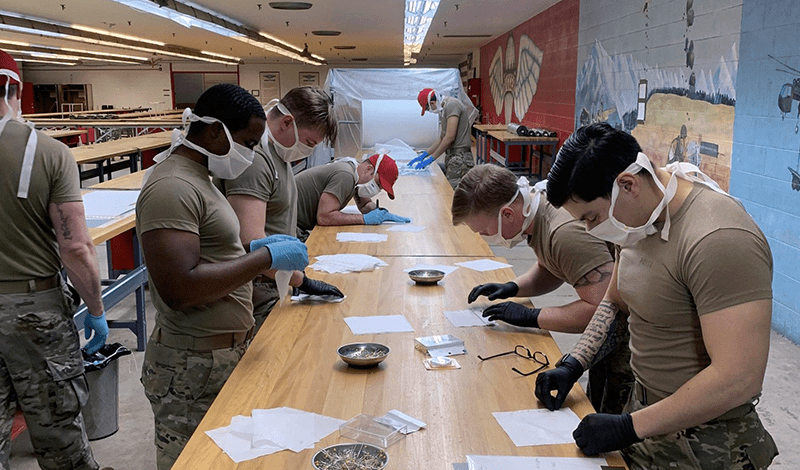
You might not know Grace Cindric by name, but anyone on social media will recognize her face. Throughout the spring, users had transformed her image into a meme, powerfully evoking strength in the face of COVID-19. In the now-famous image, the “#badassnurse” handles parking lot triage for the UNC Medical Center Emergency Department. She strides in between cars, dressed in scrubs, a facemask, and sunglasses, and sporting a sleeve of tattoos. Cindric exudes confidence. She could easily be a character in a Hollywood action film. But, in fact, she is a real-life hero for our time.

As a 2016 graduate of UNC Greensboro’s nursing program, Cindric is also a vivid reminder of the incalculable value of North Carolina’s investment in public higher education.
UNC System contributions to North Carolina’s COVID-19 efforts exemplify how higher education delivers much more than information. Our universities and affiliates improve lives through innovative instruction, research, and service—the very activities that are guiding us through this pandemic.
Instruction
With medical schools at UNC-Chapel Hill and East Carolina University, 12 undergraduate nursing programs, and 11 health sciences colleges, the UNC System trains many of the medical professionals who, like Cindric, care for North Carolinians with confirmed cases of COVID-19.
But UNC System support for cutting edge instruction plays other important roles in North Carolina’s strategic response to COVID-19. In the midst of a pandemic that has threatened to upend educational systems across the country, the UNC System’s statewide reach has helped students of all ages continue their education while staying safe at home.
When North Carolina’s stay-at-home orders went into effect in March, UNC System professors quickly moved nearly 50,000 classes online. At the same time, some institutions and affiliates also found ways to support the state’s K-12 students.

UNC-TV and the NC Department of Public Instruction partnered to support school-age children learning at home by providing free, curriculum-informed, over-the-air content. Many students live in households with limited or no internet access, but nearly every resident in all 100 counties has direct access to UNC-TV programming. This partnership between the NCDPI and the sprawling UNC System affiliate has played a vital role ensuring that even students in the most remote areas of the state can get their hands on compelling educational content.
East Carolina University provided infrastructure to help students without internet access complete the 2019-20 academic year. At several locations in its service area, the university provided internet access to students from ECU and from area K-12 schools. Moss Street Partnership School—the laboratory school operated by UNC Greensboro in partnership with Rockingham County Schools—distributed more than 230 iPads to its students. This effort helped ensure that Moss Street students had adequate access to the technology resources they needed to continue their studies.

The UNC System’s efforts don’t just benefit students. They have also helped teachers and faculty members suddenly faced with the challenge of adapting their courses for remote-learning environments.
As part of the UNC System’s rapid response to the pandemic’s escalation, senior leadership spearheaded an effort to compile a digital resource for faculty new to online teaching. The material—living in a digital realm, where it can be refreshed, refined, and enhanced as needed—delivers critical best-practices for the newly initiated remote teacher.
The UNC System made these materials freely available to any instructor, at any level, working for any institution through the United States.
Research
The COVID-19 crisis has shone a spotlight on the vital role of university research. Some of the most exciting developments in the international response to COVID-19 are unfolding in UNC System laboratories.
In fact, UNC-Chapel Hill is the highest ranked university in the U.S. for coronavirus research, according to Microsoft Academic, a global rating system that uses journal citations as the measure of influence of published faculty research.
One of the university’s more highly publicized efforts is its contribution to the potentially groundbreaking COVID-19 treatment, remdesivir. Developed through a partnership with biopharmaceutical company Gilead Sciences, remdesivir has been tested in human clinical trials, and the promising results suggest that it could become an effective treatment for COVID-19 patients.

The NC Department of Health and Human Services has partnered with both East Carolina University and UNC-Chapel Hill, along with Duke University, to study how the disease is spreading in North Carolina.
UNC System research strengthens the state’s COVID-19 efforts in many different ways, too. For example, ECU researchers, partnering with Vidant Health, developed a process for disinfecting N95 protective masks, allowing healthcare workers to safely reuse these scarce resources.
Critical contributions are taking place at virtually every UNC System institution, not just those with medical programs. System institutions are hubs for cutting-edge technologies and expertise, and many are harnessing these capacities to explore ways to mitigate the economic and social fallout caused by the pandemic.
Analytics experts at NC State created a new visualization dashboard that can help North Carolina predict which regions may “flatten the curve” or experience decreases in COVID-19 cases. Interdisciplinary faculty research clusters at Appalachian State University are studying several topics, including health disparities and the availability of COVID-related support mechanisms in rural and vulnerable communities. Faculty and staff members in the UNC Wilmington College of Health and Human Services are leading several research projects that could one day help nurse educators better utilize remote-learning technologies, older residents cope with the emotional impact of social isolation, and public leaders develop new strategies for strengthening communities in crisis.
Recent developments underscore how COVID-related research initiatives will proliferate across North Carolina. UNC Board of Governors announced that approximately $1 million in grant funding will be distributed to each of the six UNC System historically minority-serving institutions (HMSIs) through the Board’s partnership with the NC Policy Collaboratory at UNC-Chapel Hill. UNC Asheville will receive $610,000 in funding through this same partnership.
These funds will support research and activities that help fight the spread of COVID-19, especially in minority and rural populations. The funded projects will range from using drones in remote areas to transport critical healthcare supplies, to designing an anti-viral nanoparticle, to studying how to reduce the impact of social isolation on well-being—all reflecting the diversity of research unfolding across the System.
“This is yet another opportunity for the UNC System to show the meaningful impact that our historically minority-serving institutions are making in their respective regions and communities they serve. I am confident that this partnership and these programs will provide real-life solutions in the fight against COVID-19, today, and could be a model for how our state can more effectively confront tomorrow’s crises as well.”
Darrel Allison, chair of the UNC Board of Governors Committee on Historically Minority-Serving Institutions
With 17 diverse institutions, each with its own research profile and historical mission, the UNC System is generating a body of scholarship that addresses the multitude of challenges we face, from a variety of perspectives.
Service
In any crisis situation, our institutions are quick to band together to offer support to students and members of the community in need. Our campuses were largely empty through much of Spring 2020 semester. Nevertheless, each institution pursued service initiatives that reminded North Carolinians why our universities are integral to their surrounding communities and to the State.
COVID-19 forced the UNC Association of Student Governments to cancel or reschedule a number of events. Rather than letting the money originally earmarked for event planning and travel sit idly by, the organization announced that it would distribute unused dollars to student emergency funds at each of the constituent institutions. These contributions will directly benefit students facing financial challenges as a result of the pandemic and keep them in a position to continue their education.
The association soon learned that this charitable gesture would have an even greater impact than anticipated, when an anonymous donor matched the funds. Inspired by this generosity, other funders stepped up with a matching or larger gift. These include a $250,000 gift from the John M. Belk Endowment, a $235,000 gift from the C.D. Spangler Foundation, and a $160,000 contribution from Blue Cross and Blue Shield of North Carolina.
In many instances, UNC System outreach and engagement directly impacts the state’s capacity to protect health, wellbeing, and economic vitality. Medical professionals on faculty and staff at our institutions and affiliated hospitals offered virtual visits to local residents. Several institutions have donated supplies to area hospitals. NC State has developed, produced, and donated more than 6,000 meters of a unique unwoven fabric filtration material to Ft. Bragg.

Not long after the State officially issued stay-at-home protocols, faculty, students, and staff were already utilizing their expertise and research skills to help entrepreneurs, businesses, and industry weather the downturn.
UNC Asheville and East Carolina hosted information sessions and virtual town halls to help small business owners locate essential resources and take advantage of relief packages.
Students in UNC Greensboro’s hospitality and tourism capstone course spent the spring helping communities in Rockingham County develop and strengthen tourism in the area, including developing recommendations on how communities can recover from the fallout. And, NC State’s extension program provides resources and daily updates to assist farmers in the state with everything from food safety practices to supporting the agribusiness economy.
More broadly, the UNC System’s Small Business and Technology Development Center has served nearly 3,000 small businesses this calendar year to date, helping clients obtain $132 million in capital and retain 3,680 jobs. In April, the center secured CARES Act funding. This financial support will significantly expand its capacity to offer business management services and resources through its 16 offices, hosted by the constituent institutions of the UNC System.
Our Institutions: Hubs for Everyday Heroism
These are not isolated examples. Even as COVID-19 seemed to bring all of North Carolina to a halt, faculty, students, and staff still found ways to bring their skills, knowledge, and energy out to our communities.
UNC System work reaches every North Carolinian in some way. In this time of national crisis, North Carolinians aren’t rallying around masked action figures dressed in capes and Lycra. We are depending on and cheering for the medical professionals, researchers, and other “COVID Warriors” with higher education credentials. This is a reminder that the UNC System strengthens us all and readies North Carolina to face its biggest challenges.
Faculty, staff, and students will return to their home institutions in the fall. Life on campus will look much different than it did a year ago. Dialogue will be muffled by face coverings. Group work and peer collaboration will be reconfigured with social distance in mind. Hands chapped from copious amounts of soap and sanitizer will tap away on keyboards. Many students will need to adjust to compressed semesters.
But the Spring 2020 semester made it clear that the UNC System community is remarkable, resilient, and resourceful. The fall semester might have its unique challenges, but each institution will hum with activity and enthusiasm.
The expansive scope of this activity will make one thing quite clear: our public universities don’t just improve the lives of the students who attend classes. They benefit every North Carolinian in some form or fashion.